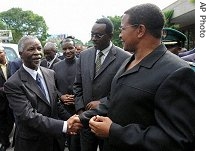2006年VOA标准英语-Burundi Government, Rebels Sign Ceasefire(在线收听)
By Cathy Majtenyi
Nairobi
07 September 2006
The government of Burundi and the country's last remaining rebel group Thursday met in Tanzania and finalized a ceasefire that seeks to end more than a dozen years of civil war.
-----
 South Africa's President Thabo Mbeki, left, shakes hands with Tanzania's President Jakaya Kikwete at a summit in Dar Es Salaam Sunday, June 18, 2006 |
||
They, along with other officials, sat down with Burundi President Pierre Nkurunziza and leaders of the National Liberation Forces, known by its French acronym FNL, and finalized a ceasefire initially signed in June.
Burundian journalist Eric Manirakiza tells VOA during the negotiations the rebel group expressed its anger over the resignation of Vice President Alice Nzomukunda, who the rebels say had the interests of the country at heart. Nzomukunda quit earlier this week, citing government corruption and human rights abuses.
According to the French news agency, AFP, the rebels also called for the military to be overhauled to better reflect Burundi's ethnic composition of majority Hutus and minority Tutsis.
Journalist Manirakiza says even with the ceasefire, there needs to be a mechanism put into place to ensure that the ceasefire holds.
"There is a problem of security, problem of human rights," he said. "So even if FNL signs any peace ceasefire, there has [to be a] movement which imposes a neutral force in order to keep or to accompany the agreement until its implementation, because now there is violation of human rights"
Burundi's civil war broke out in 1993 after the Tutsi-dominated army assassinated the country's first democratically elected president, who was a Hutu.
Tutsis make up about 15 percent of Burundi's population, yet until recently they dominated the army and political sphere, a factor that sparked the war that killed some 300,000 people.
A peace process beginning in 2000 culminated in democratically held elections last year. The peace process called for the various rebel groups fighting in the war to be integrated into the army and government. The FNL has yet to do so.